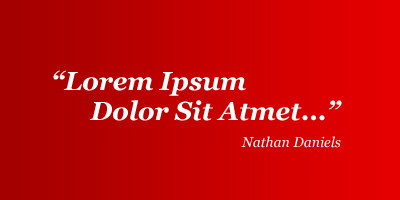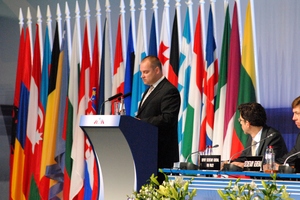| Address by Gundars Daudze, Speaker of the Saeima, at the Plenary Sitting of the NATO Parliamentary Assembly’s Spring Session (01.06.2010) |
 |
|
It is my genuine pleasure to address the participants of the Spring Session of the NATO Parliamentary Assembly, as well as guests from the parliaments of NATO member states and associate countries. Today’s plenary sitting is the central event of the Session, and it marks the conclusion to several days of intensive work by participants in committee meetings, meetings of political groups, and the NATO-Russia Parliamentary Committee. It has been an opportunity for members of parliaments representing more than 40 countries to jointly and openly address the main challenges of global security in the 21st century. Numerous experts in the sphere of security and influential politicians have gathered in Riga. I am certain that the Spring Session of the NATO Parliamentary Assembly in 2010 has once again proved the importance of this parliamentary forum and that it will serve as a significant contribution to a global discussion on defence and security policy. I would like to extend my gratitude to all participants of the Assembly, representatives of governments and NGOs, as well as academicians who were actively involved in committee discussions. May you have creative and stimulating debates during this plenary session as well.
The NATO Parliamentary Assembly is being held in Latvia at a time when we are celebrating the 20th anniversary of the restoration of the statehood of Latvia. In honour of this anniversary, participants of the Assembly have received a special gift – a silver coin – commemorating the restoration of Latvia’s independence on 4 May 1990. We wanted to share with our guests the events which have been the most significant for our country, to explain the complex history of this region, and to show the reasons why the concept of security has been and will always remain in the centre of our attention. Slightly more than 20 years ago, the name of Latvia could not be found on most maps of the world. Inhabitants of our country, like other people in Central and Eastern Europe, lived under totalitarian and communist dictatorship and were subjected to the experiments of a planned economy. However, that could not erase the yearning of our people for independence and freedom. Just as the main symbol of our state, the Monument of Freedom, proudly stood in the centre of Riga throughout these years, the idea of freedom remained alive in our minds. The longing for independence, basic human rights, and a return to the family of democratic European countries was the driving-force for major changes. Soon after regaining its independence, Latvia set its strategic goals – membership in the North Atlantic Treaty Organisation and the European Union. In order to achieve them, it was necessary to ensure general political support and to consolidate all available resources. In a comparatively short period of time, Latvia implemented significant reforms which took other countries decades to accomplish. Our aim was clear – we wanted to live in security and peace in a democratic and flourishing country. This year Latvia can look back at our six-year-long membership in the North Atlantic Treaty Organisation. We already can share this experience with other countries aspiring for NATO membership. NATO has given us security guarantees; and, for our part, we are ready to assume responsibility for our commitments and to contribute to the development of the Alliance. We do that by participating in missions which the Alliance has undertaken. We do that by placing our soldiers side by side with soldiers of other NATO member and partner states in international operations abroad. Today, I would like to thank all those who, for the sake of our future and security, are carrying out difficult tasks far from their homeland. At the same time, we politicians also have to assume significant responsibilities. We have to be able to respond appropriately to changes in geopolitical processes and to suggest to the Assembly possible ways to deal with security challenges, such as international terrorism, energy security, piracy and cyber terrorism. Therefore, I would like to highlight the significant role of the NATO Parliamentary Assembly, which is celebrating its 55th anniversary this year. The parliamentary dimension of the Alliance not only strengthens the unity of its member states but also helps to ensure parliamentary scrutiny of issues related to security and defence. Nowadays, the Parliamentary Assembly has become a platform for seeking solutions to the most pressing problems. That has been confirmed by the reports which have been reviewed during this Session and the ensuing lively discussions. During today’s plenary sitting, we will focus on two significant issues which are priorities on the Alliance’s agenda. Guests of the Assembly will have the opportunity to listen to and to pose questions to the Minister for Defence of Afghanistan regarding the current situation in his country and on the Peace Jirga, a large national gathering with representatives from all bodies of power which takes place right at this moment. The NATO mission to Afghanistan is the priority of military forces of several countries which are represented here. However, concurrently with the matter of military involvement, we also have to think about economic growth and development of administrative capacity in this country. From this perspective, in my opinion, the contribution of parliamentarians of the states represented here is essential. The Riga Session is also significant because the NATO Secretary General will present the proposals of the expert group on the new NATO Strategic Concept. This new NATO Strategic Concept must become the instrument for bringing about changes in NATO; it must be a response of the largest global collective defence organisation to modern security challenges. On 16 April, members of the NATO member-state parliaments submitted their proposals to the NATO Secretary General on points which should be included in this document. Today we will have the opportunity to hear Mr. Rassmussen’s report on the subsequent development of the Concept. In my opinion, it is essential to ensure a structured and transparent process of further consultations and to adopt during the NATO Lisbon Summit at the end of this year a document which would
The power of NATO lies in its ability to transform itself. The NATO Parliamentary Assembly has often facilitated these transformations. We still highly appreciate the fact that the Parliamentary Assembly once made a positive decision and influenced the final decision on including new countries, including Latvia, into the North Atlantic Treaty Organisation. By welcoming guests in our country during these days, we can prove that we greatly appreciate that decision. We can prove that Latvia is willing and able to contribute to the development of the Alliance and to global security. I would like to extend gratitude to all organisers of the NATO Parliamentary Assembly, including the NATO PA International Secretariat, employees of the Saeima of the Republic of Latvia, and numerous volunteers who worked hard to help make this Session a success. The programme of the Session was drawn up to give our guests a chance to get acquainted with the history of our country, its cultural heritage, and traditions which have been cherished for centuries. We wanted them to get acquainted not only with the more than 800-year-long history of Riga but also with the most beautiful and significant values in our rural regions. I hope that each of you will have the best memories about Latvia, and will want to return and experience again our hospitality, the beauty of our towns, and the charm of our unspoiled nature. I would like to thank all guests coming from near and from far for their participation in the NATO Parliamentary Assembly’s Spring Session in Riga. I wish you a successful and creative work in the plenary session. May this Session strengthen the Alliance so that it can spread peace and security throughout the world, and may it create a feeling of security in all of us. Thank you for your attention. |




 Honourable President of the NATO Parliamentary Assembly;
Honourable President of the NATO Parliamentary Assembly;